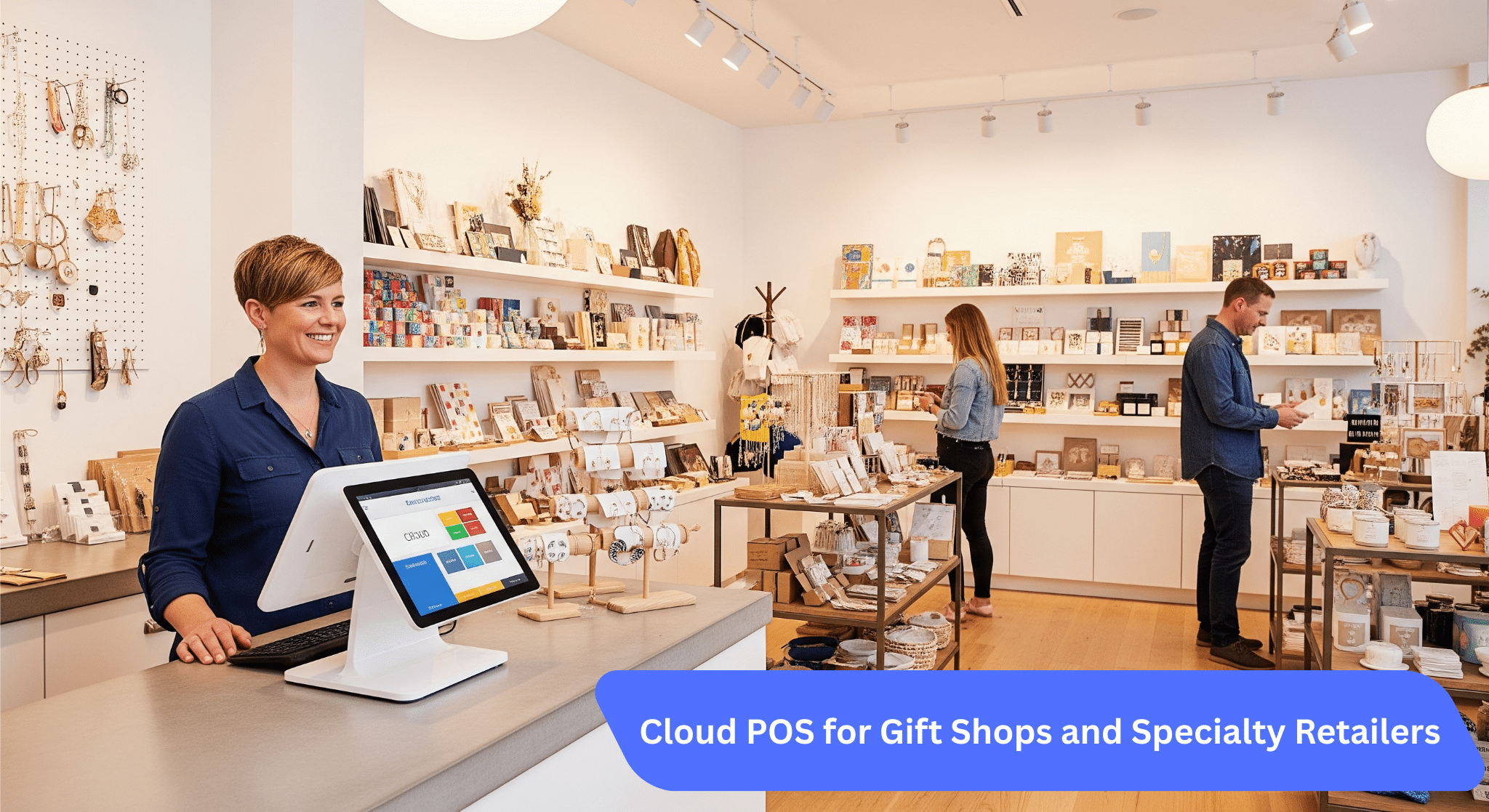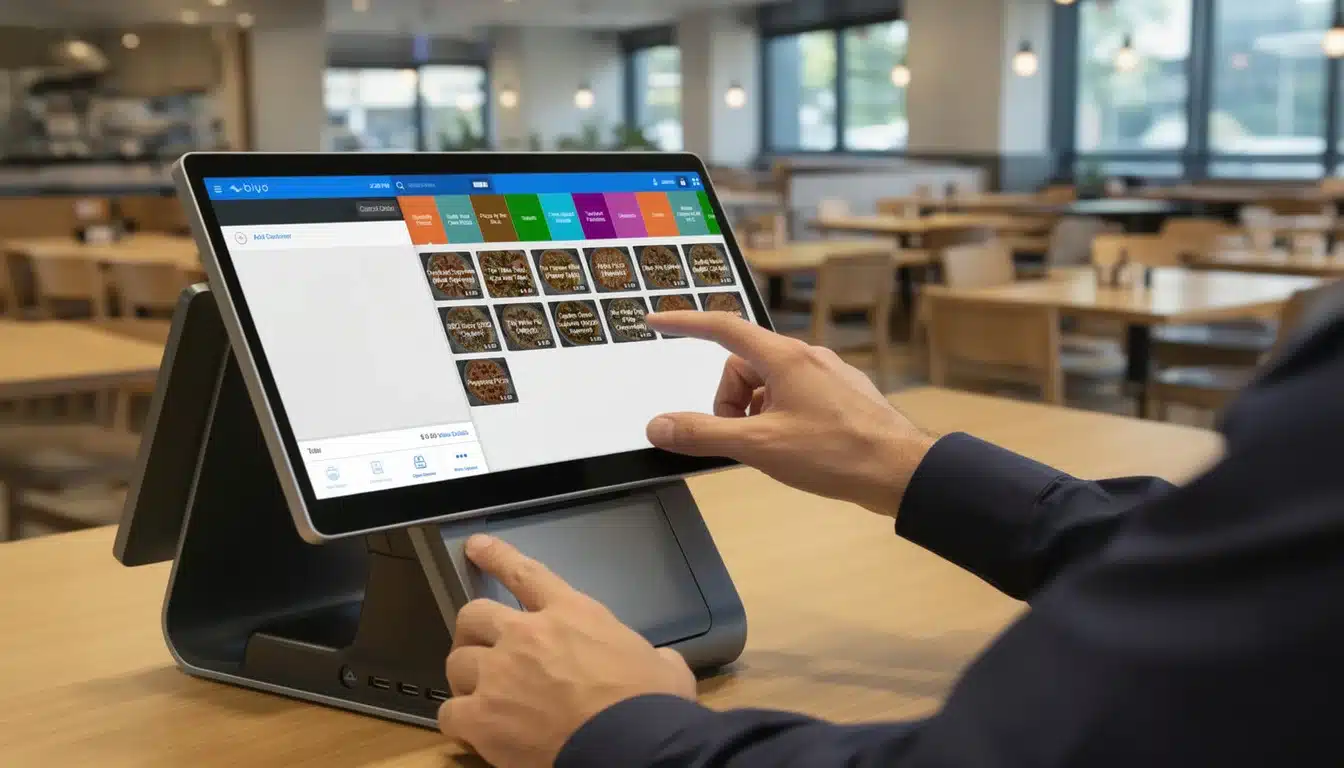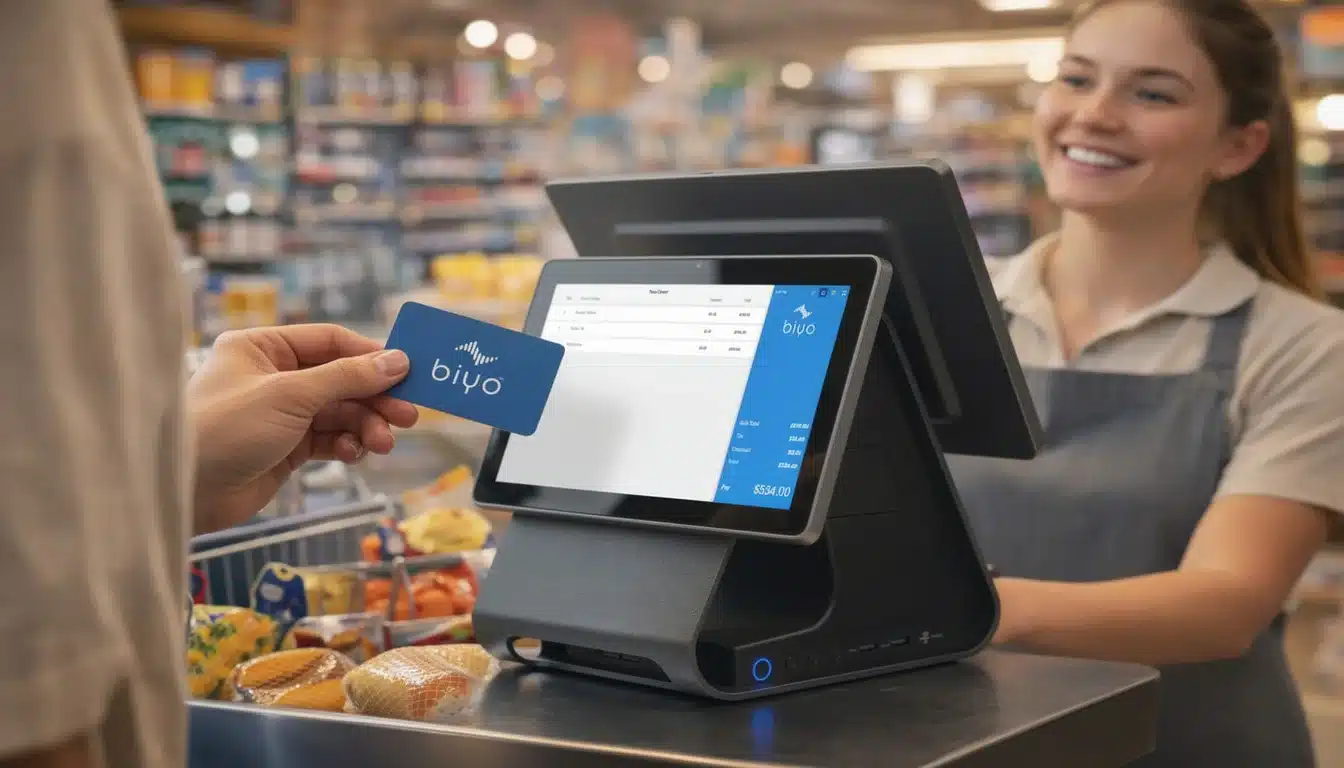Running a gift shop or specialty retail store comes with unique challenges. From managing diverse inventory to building strong customer loyalty, every detail matters. This is where a cloud POS for gift shops and specialty retailers makes a major difference. By offering tools like real-time analytics, inventory tracking, barcode scanning, and multi-location support, these systems simplify operations and enhance customer experience. Let’s dive into why cloud-based POS solutions are a must-have for specialty retailers in today’s competitive market.
Table of Contents
- Why Cloud POS is Transforming Specialty Retail
- Inventory Tracking and Vendor Management
- Customer Loyalty and Personalized Shopping
- E-Commerce Integration and Multi-Channel Selling
- Sales Reporting and Retail Analytics
- FAQ
Why Cloud POS is Transforming Specialty Retail
Cloud-based systems have shifted how retailers manage operations. Unlike traditional POS systems, cloud solutions give flexibility, scalability, and mobility. A cloud POS for gift shops and specialty retailers helps connect every aspect of business management into one streamlined platform.
Flexibility with Mobile POS
Gift shops often experience seasonal traffic spikes, especially around holidays or tourist seasons. During these times, long checkout lines can frustrate customers and reduce overall sales. A mobile POS built on the cloud eliminates this challenge by empowering staff to check out customers directly on the shop floor using tablets or handheld devices. This makes the buying process smoother, cuts waiting times, and enhances the shopping experience for busy customers who value efficiency. By allowing transactions to occur anywhere in the store, retailers can serve more people without needing additional checkout counters.
The ability to process payments on the go also opens new opportunities for specialty retailers to sell outside their physical store. For example, a local artisan gift shop might set up a booth at a weekend craft fair. With mobile POS, staff can complete sales seamlessly and keep inventory updated in real time across all sales channels. This flexibility helps shops capture revenue from events and pop-ups that would otherwise require manual workarounds. In short, mobile POS extends the store’s reach and profitability beyond its walls.
From an operational perspective, mobile POS integration also enhances staff efficiency. Sales associates can instantly look up product availability, pricing, or discounts without leaving the customer’s side. This level of service makes shoppers feel attended to and valued, improving the likelihood of repeat visits. For specialty retailers, where building long-term customer relationships is key, this feature is not just about convenience—it’s about creating memorable shopping experiences that drive loyalty.
Multi-Location Support
Many specialty retailers expand beyond a single storefront, whether by opening branches in different neighborhoods, launching seasonal kiosks, or testing new markets. Managing these locations without a unified system can quickly become overwhelming. A cloud POS centralizes control, enabling owners to monitor all stores in real time from one dashboard. This means they can compare performance metrics, adjust inventory, and standardize pricing across multiple sites with ease. Centralized oversight eliminates the risk of inconsistencies that can confuse customers or erode trust.
Real-world examples highlight the benefits of multi-location management. Suppose a chain of boutique gift shops sees one location selling out of a popular candle set, while another location still has stock. A cloud POS enables managers to transfer items quickly, reducing lost sales opportunities. Without such visibility, shops might reorder unnecessarily, tying up cash in excess stock while missing sales at the busier branch. The system’s efficiency ensures smoother logistics and better resource allocation across all outlets.
This feature also streamlines marketing and promotions. Specialty retailers can launch storewide discounts or holiday promotions that update instantly across every location. Customers benefit from consistent pricing and offers no matter where they shop. Owners gain peace of mind knowing that their brand image and customer experience remain uniform. For businesses with aspirations to scale, cloud POS multi-location support is not just helpful—it is essential for sustainable growth.
Secure Transactions and Cloud-Based Reliability
Security is a top priority for any retailer, especially those handling sensitive customer payment data. A cloud POS for gift shops and specialty retailers ensures compliance with industry standards like PCI DSS, using advanced encryption protocols to protect cardholder information. This level of security reassures customers that their data is safe, which in turn builds trust and encourages repeat purchases. Shoppers are more likely to return to a store where they feel confident about the safety of their financial details.
Cloud-based systems also offer reliability through continuous backups and redundant storage. Unlike traditional POS systems that rely heavily on local servers vulnerable to crashes or theft, cloud POS data is stored securely in remote servers. If one device fails, another can quickly pick up without losing transaction history. Automatic syncing ensures that sales, inventory, and customer records remain up-to-date across all devices, minimizing downtime during technical issues. This level of redundancy is invaluable for specialty retailers, where lost data could mean lost revenue and damaged customer trust.
Another overlooked advantage is resilience during unexpected events. For instance, if a sudden internet outage occurs, many cloud POS platforms offer offline functionality that continues processing transactions. Once the connection is restored, the system syncs all sales back into the cloud. This ensures business continuity even during disruptions. For specialty retailers that depend on peak seasonal sales, this reliability can make the difference between a profitable season and one riddled with customer frustration.

Inventory Tracking and Vendor Management
One of the biggest challenges for specialty retailers is managing diverse product ranges. From handmade jewelry to seasonal décor, accurate tracking is critical. A cloud POS for gift shops and specialty retailers gives tools to control stock and streamline vendor relationships.
Real-Time Inventory Tracking
Real-time inventory tracking is one of the most powerful advantages of cloud POS systems. Each transaction automatically updates stock levels, giving managers instant visibility into what is selling and what is running low. This eliminates the need for manual stock counts, which are both time-consuming and prone to errors. By always knowing current inventory levels, retailers avoid the embarrassment of selling out-of-stock items or over-ordering products that sit unsold on shelves.
Seasonal gift shops in particular benefit from this feature. For example, a shop specializing in holiday décor can monitor which ornaments are most popular and reorder them before demand peaks. Without real-time tracking, the shop risks missing sales opportunities and disappointing customers. Data-driven insights allow managers to anticipate trends and prepare inventory accordingly. This proactive approach improves both sales and customer satisfaction.
Inventory tracking also supports cash flow management. Specialty retailers often work with limited budgets, and overstocking ties up capital in unsold goods. Real-time insights highlight which items are underperforming, allowing owners to discount or bundle them before they become dead stock. This ensures shelves are filled with products that move, maximizing profitability per square foot of store space.
Barcode Scanning and Product Catalog Management
Barcode scanning simplifies and accelerates retail operations. At checkout, scanned items are recognized instantly, reducing errors and ensuring accurate pricing. This speeds up lines, particularly during peak shopping hours, and enhances the customer experience. Customers leave the store with confidence that their purchases were processed quickly and correctly, improving the likelihood of repeat visits.
A well-organized product catalog complements barcode scanning by ensuring every item is categorized properly. Specialty retailers often carry unique or handmade goods that require custom descriptions. Cloud POS platforms allow businesses to create detailed entries, complete with photos, SKUs, and tags. This makes it easier for staff to locate items in the system and for managers to generate meaningful reports. By digitizing the catalog, retailers gain both organization and insight.
Beyond efficiency, catalog management aids in strategic decision-making. For instance, if the system shows that eco-friendly candles outsell other types, retailers can increase orders for that category. Likewise, slow-moving categories can be reevaluated for pricing or promotional adjustments. A clear digital record of inventory patterns helps businesses tailor their offerings to actual customer demand, strengthening competitiveness in a crowded market.
Vendor Management and Stock Reordering
Specialty retailers frequently deal with multiple vendors, each supplying different categories of products. Managing these relationships manually is inefficient and increases the risk of errors. A cloud POS for gift shops and specialty retailers streamlines vendor management by tracking purchase orders, delivery timelines, and supplier performance all in one place. This creates transparency and helps owners identify which vendors are most reliable, ensuring smoother supply chain operations.
Automated reordering takes this process one step further. When a product reaches a predefined threshold, the system automatically generates a purchase order, ensuring shelves stay stocked without constant manual oversight. For example, a boutique that sells handmade soaps can set minimum levels so that when lavender soap falls below ten units, an order is automatically placed with the supplier. This prevents stockouts of popular items and improves customer satisfaction.
In addition, vendor performance analytics highlight which suppliers deliver on time and which frequently cause delays. Retailers can use this information to renegotiate contracts, adjust order volumes, or seek alternative partners. Reliable vendor management strengthens the entire retail operation by aligning supply with demand. In turn, this minimizes wasted time and keeps specialty shops focused on what they do best—delivering unique products and experiences to their customers.
Customer Loyalty and Personalized Shopping
Specialty retailers thrive on customer relationships. Unlike big-box stores, they often serve repeat shoppers who value personalized service. A cloud POS for gift shops and specialty retailers strengthens these connections with loyalty tools and CRM integration.
Customer Loyalty Programs
Loyalty programs are critical for retaining customers in today’s competitive retail environment. Instead of relying on outdated punch cards, cloud POS systems digitize the entire process. Customers earn points automatically with each purchase, and rewards can be tailored to their shopping habits. This personalization gives shoppers a reason to return and strengthens the emotional connection to the brand. For specialty retailers, where personal service is often the differentiator, these programs can significantly increase repeat business.
Successful examples abound. A local gift shop may implement a program where every dollar spent equals one point, redeemable for discounts or exclusive items. Over time, loyal customers accumulate enough points to receive special rewards, making them feel valued and appreciated. By contrast, without such programs, customers might be lured away by larger competitors offering blanket discounts. Loyalty systems provide a competitive edge by creating tangible value for regular shoppers.
Another advantage is the ability to integrate loyalty programs across channels. Customers shopping online or in person enjoy the same benefits, ensuring consistency. This omnichannel loyalty builds brand trust, as customers feel confident they are recognized and rewarded regardless of where they shop. Specialty retailers can further enhance this by offering unique rewards, such as early access to limited-edition products, which reinforces their niche appeal.
Gift Cards and Discount Management
Gift cards are a powerful tool for specialty retailers, as they serve both as a revenue generator and a customer acquisition strategy. A cloud POS tracks balances automatically, eliminating manual errors and ensuring smooth redemption. Digital gift cards are especially valuable for online shoppers, enabling purchases across physical and digital stores seamlessly. This flexibility widens the retailer’s customer base, as people often purchase gift cards for friends or family outside the immediate area.
Discount management is another critical feature. Specialty retailers often run seasonal promotions, clearance sales, or exclusive discounts for loyalty members. Cloud POS systems ensure these discounts apply correctly at checkout, preventing confusion and building trust. For example, during a holiday sale, the system can automatically apply a 15% discount to all holiday décor items, making checkout quick and error-free. This creates a smooth customer experience while also boosting sales volume during key periods.
The real value lies in analytics. Retailers can track which promotions drive the most sales and which have limited impact. These insights help businesses refine future campaigns and allocate marketing budgets more effectively. Over time, data-driven discount strategies maximize both revenue and customer satisfaction. Gift cards and discount management, when combined, ensure specialty retailers maintain steady sales throughout the year.
CRM Integration and Personalized Service
Customer relationship management (CRM) integration is a game-changer for specialty retailers who depend on repeat business. Cloud POS systems store customer profiles, purchase histories, and preferences, creating a detailed picture of each shopper. With this information, retailers can provide highly personalized service, such as recommending products that align with past purchases or sending tailored offers. Personalization not only increases conversion rates but also fosters stronger emotional bonds with the brand.
Practical applications are easy to see. A boutique gift shop might notice that a customer frequently buys artisanal teas. Staff can then suggest related products, like teapots or accessories, during future visits. Alternatively, the system might trigger an automated email campaign with special promotions on new tea arrivals. These touches demonstrate attentiveness and elevate the shopping experience from transactional to relational, building long-term loyalty.
CRM integration also benefits staff training and efficiency. Sales associates can access customer data during interactions, allowing them to make informed recommendations. For new employees, this data provides insights into common customer preferences, shortening the learning curve. Over time, customer satisfaction improves, as shoppers feel recognized and understood on a personal level. Specialty retailers stand out when they make customers feel like more than just another transaction.
E-Commerce Integration and Multi-Channel Selling
Modern shoppers expect to shop anywhere—online and in-store. A cloud POS for gift shops and specialty retailers connects physical and digital sales channels seamlessly.
E-Commerce Integration
Cloud POS systems integrate directly with popular e-commerce platforms, enabling retailers to unify their online and offline sales operations. This integration ensures that when a product sells online, the inventory count automatically updates in real time across all channels. For specialty retailers, this prevents the common frustration of double-selling items, particularly for unique or limited-edition products. Customers receive accurate information, and retailers protect their reputation by avoiding order cancellations.
Managing online and offline stores from a single system saves significant time. Instead of logging into multiple platforms to update product details, retailers can adjust prices, descriptions, or promotions once within the POS system, and those changes reflect everywhere. This consistency strengthens brand image and reduces the risk of errors that confuse customers. Whether updating seasonal décor for the holidays or adjusting pricing for clearance sales, retailers benefit from streamlined processes.
Another major benefit is the ability to support multiple fulfillment options, such as curbside pickup, local delivery, or nationwide shipping. Customers value flexibility, and retailers who provide it often see increased sales. For example, a local boutique might gain new customers across the country by offering online sales backed by reliable inventory management. E-commerce integration is no longer optional—it is a necessity for growth in today’s retail landscape.
Omnichannel Customer Experience
Consumers today do not distinguish between online and in-store shopping—they expect a seamless experience across all channels. A cloud POS ensures that customers enjoy consistent service whether they are browsing a website, visiting a store, or interacting on social media. For example, a customer might order a gift online but decide to pick it up in person. With an integrated system, the process is effortless, as both the website and store staff access the same data in real time.
Loyalty programs benefit significantly from this approach. Customers can earn and redeem points regardless of where they shop, making the program more attractive and rewarding. If a customer buys online but wants to return the item in-store, omnichannel POS systems handle the transaction seamlessly. This flexibility builds trust and encourages repeat business, as shoppers know they can interact with the brand in whichever way suits them best.
Omnichannel capabilities also strengthen marketing campaigns. Retailers can launch promotions that apply both online and offline, ensuring broad reach. Data collected from different touchpoints helps refine targeting, as retailers understand how customers move between channels. Over time, this creates a more personalized and engaging experience that sets specialty retailers apart from less adaptable competitors.
Customizable Interfaces for Retailers
Every retailer has unique operational needs, and a one-size-fits-all system rarely delivers maximum efficiency. A cloud POS for gift shops and specialty retailers addresses this by offering customizable interfaces. Retailers can configure dashboards to highlight the most relevant metrics, such as seasonal bestsellers or vendor performance. This ensures that managers access the information they need most without wading through irrelevant data, making decision-making faster and more informed.
Custom workflows also reduce training time for employees. For example, a boutique specializing in personalized gifts might customize its POS to feature quick access to engraving options. New staff can learn the system faster, and errors decrease, improving the overall customer experience. By aligning the POS interface with daily tasks, retailers enhance both efficiency and accuracy in operations.
The ability to adapt the system also future-proofs the business. As customer expectations evolve, retailers can reconfigure dashboards or workflows without needing to purchase an entirely new system. This flexibility makes cloud POS a long-term investment, ensuring that the technology remains relevant as the business grows and changes. For specialty retailers with niche needs, this adaptability is invaluable.
Sales Reporting and Retail Analytics
Data-driven decision-making is essential in modern retail. A cloud POS for gift shops and specialty retailers delivers insights that help managers refine strategies and improve profitability.
Real-Time Sales Reporting
Cloud POS systems deliver immediate visibility into sales activity. Instead of waiting for end-of-day reports, managers can track transactions as they occur. This enables quick decision-making, such as adjusting staffing levels during unexpectedly busy hours. Specialty retailers gain a competitive edge by responding in real time, rather than reacting after the fact. With accurate, up-to-the-minute data, managers always know where their business stands.
Detailed sales reports also uncover patterns that would otherwise go unnoticed. For instance, data may show that certain gift items sell faster during weekends or that specific promotions drive weekday traffic. Retailers can use these insights to optimize scheduling, adjust promotions, and improve customer service. Over time, this fine-tuning leads to higher sales and smoother operations, particularly during peak shopping seasons.
Another advantage is transparency across teams. Managers can share reports with employees to highlight performance and set clear expectations. Staff become more engaged when they understand how their efforts impact overall success. For specialty retailers, where every sale counts, this shared visibility fosters a culture of accountability and motivation.
Retail Analytics for Smarter Strategies
Retail analytics go beyond basic sales tracking to provide deep insights into customer behavior and market trends. Specialty retailers can analyze which demographics buy certain products, how seasonal patterns affect demand, and which marketing efforts deliver the best return. Armed with this knowledge, businesses can design targeted campaigns that resonate with their core audience. For example, if analytics reveal that eco-friendly products appeal to younger shoppers, retailers can emphasize sustainability in their promotions.
Analytics also inform inventory management. By examining historical sales data, retailers can forecast demand more accurately and adjust purchasing decisions. This reduces the risk of overstocking slow-moving items or understocking bestsellers. Specialty retailers that rely heavily on seasonal demand, such as holiday shops, particularly benefit from these predictive capabilities. They can prepare stock levels in advance, ensuring shelves remain full when demand peaks.
Financial planning is another area strengthened by analytics. Retailers can project revenue growth, set realistic sales targets, and identify cost-saving opportunities. Data-driven strategies reduce guesswork, enabling businesses to operate with confidence and precision. Over time, analytics help specialty retailers refine their operations for greater efficiency and profitability, ensuring long-term sustainability in a competitive environment.
Employee and Performance Management
A cloud POS system does more than track sales—it also provides visibility into employee performance. Managers can monitor individual sales figures, upselling rates, and customer service metrics, creating a data-driven approach to performance evaluation. This ensures that recognition and rewards are based on measurable outcomes, motivating staff to perform at their best. For specialty retailers, where staff play a vital role in delivering personalized service, this accountability is invaluable.
Performance data also highlights areas for improvement. If an employee consistently struggles with upselling, managers can provide targeted training to build skills. Conversely, top-performing staff can be recognized and used as examples for others to follow. This creates a culture of continuous improvement, benefiting both employees and customers. The result is a more skilled, motivated workforce that drives business growth.
By linking employee performance with business outcomes, retailers can align staff incentives with organizational goals. Bonuses or promotions tied to specific sales milestones encourage staff to contribute more actively to store success. Over time, this alignment boosts morale and retention, reducing turnover costs. Specialty retailers thrive when their employees feel engaged and appreciated, and a cloud POS system makes this alignment measurable and achievable.

About Biyo POS
If you’re looking for a powerful cloud POS for gift shops and specialty retailers, Biyo POS delivers everything you need. From inventory tracking to e-commerce integration, our system is built for modern retail. Schedule a free call here to learn how Biyo POS can transform your store. Ready to get started? Sign up today at https://signup.biyo.co/.
FAQ
What is the main advantage of cloud POS for specialty retailers?
The biggest advantage is real-time visibility and flexibility. Retailers can manage sales, inventory, and customer data from anywhere, across multiple devices.
Can cloud POS work offline?
Yes. Most modern systems allow offline functionality. Transactions are stored locally and sync back to the cloud once the connection is restored.
How does cloud POS improve customer loyalty?
Cloud POS integrates with loyalty programs, gift cards, and CRM tools. This makes it easy to reward customers, personalize offers, and improve shopping experiences.
Is cloud POS secure for transactions?
Absolutely. Cloud POS systems use encryption and compliance standards like PCI DSS to protect customer payment data and retailer information.
Does cloud POS support e-commerce integration?
Yes. A cloud POS for gift shops and specialty retailers syncs inventory across in-store and online channels, preventing overselling and ensuring smooth operations.




